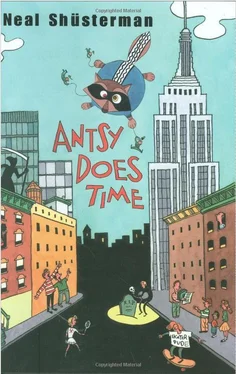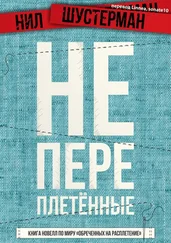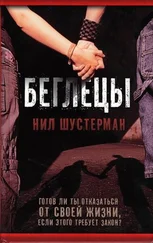RM. Smoot
Signature
Ralphy Sherman
Signature of Witness
8.Who Needs Cash When You’ve Got Time Coming Out of Your Ears?
I have never been in the habit of cheating at school. I mean, sure, the occasional glance at my neighbor’s paper on a multiple-choice test or a list of dates written on my forearm, but nothing like what Skaterdud wanted me to do. Now not only did I have to write two passing papers, but I had to make one of them sound like he wrote it—which meant sounding all confusing but making enough sense to get a passing grade.
The Dud’s paper got a B with an exclamation point from the teacher, and since I used all the good stuff in his paper, I got a C-minus on mine. Serves me right. The Dud gave me my month commission the morning we got our grades back, slapped me on the back when he saw my grade, and said, “You’ll do better next time.”
That day I went off campus to get pizza for lunch, because the lunch ladies were secretly spreading the word that this was a good day to do a religious fast.
Problem was, I didn’t have any money. Rishi, who ran the pizza place down the street, was Indian. Not Native American, but Indian Indian—like from India—and, as such, made pizza that was nothing like the Founding Fathers ever envisioned. Not that it was bad—actually each type he made was amazing, which is maybe why the place was always crowded, and he could keep raising his prices.
I stood there, drooling over a Tandoori Chicken and Pepperoni that had just come out of the oven, and began rummaging through my backpack for spare change—but all I came up with were two nickels, and a Chuck E. Cheese game token that came out as change from one of those high-tech vending machines that was either defective or knew exactly what it was doing.
Rishi looked at me, and just shook his head. Meanwhile the people in line behind me were getting impatient. “C’mon,” said Wailing Woody, his beefy arm around his girlfriend’s shoulder. “Either order or get out of the way.”
What I did next was probably the result of low blood sugar. I opened my binder to see if maybe some coins got stuck under the clasp, and saw the page I had gotten from Skaterdud. My commission. I pulled it out, looked once more at the pizza, and desperately held it up to Rishi.
“I don’t have cash, but what about this?” I said. “One month of some guy’s life.”
A couple of people in line snorted, but not everyone. After all, I had been on Morning Announcements. I was legit. People actually got quieter, waiting to see what Rishi would do. He took it from me, laughed once, laughed twice, and I figured my religious fast was about to begin ... until he said, “What kind of pizza would you like?”
I was still staring at him, waiting for the punch line, when Woody nudged me and said, “Order already!”
“Uh ... how many slices is it worth?”
“Two,” Rishi said, without hesitation, like it was written on the menu.
I ordered my two slices of Tandoori Chicken-and-Pepperoni, and as he served them he said to me, “I shall frame this and hang it on the wall, there.” He pointed to a wall that held a bunch of photos of minor celebrities like the Channel Five weatherman, and Cher. “It will be the cause of much conversation! Next!”
At this point, I’m just figuring I’m lucky—that this is a freak thing. But like I said, other people saw this—people who hadn’t eaten, and maybe their brains were working like that high-tech vending machine, which, when I got back to school, gave me a can of Coke for a Chuck E. Cheese token, thinking it was a Sacagawea dollar coin.
The second I popped that soda open, Howie appeared out of nowhere, in a very Schwa-like way, complaining of the kind of thirst that ended empires. “Please, Antsy, just one sip. I swear on my mother’s life I won’t backwash.”
I took a long, slow guzzle from the can, considering it. Then I said, “What’s it worth to you?”
I walked away with two weeks of his life.
***
There’s this thing called “supply and demand.” You can learn about this in economics class, or in certain computer games that simulate civilizations. You also can blow up those civilizations with nuclear weapons—which is only fun the first couple of times, and then it’s like enough already—why spend three hours building a civilization if you’re just gonna blow it up? That’s three hours of your life you’re never gonna get back—and ever since time shaving became a part of my daily activities, I’ve become very aware of wasted time—whether it be time wasted on the couch watching reruns, or time spent destroying simulated nations. When I first got that game, by the way, it cost fifty bucks, but now you can get it in the sale bin for $9.99. That’s supply and demand. When everybody wants something and there’s not enough to go around, it costs more. But if nobody wants it, it costs next to nothing. In the end, it’s people who really decide how much something is worth.
As the undisputed Master of Time, I was the one in complete control of the time-shaving industry. That meant I controlled the supply, and now that I knew I could trade time for other stuff, I began to wonder how big the demand could be.
Turns out I didn’t have to wait long to find out. The next morning, Wailing Woody Wilson came to me with his girlfriend to settle a dispute.
“I forgot we had a date last night, and Tanya was all mad at me.”
“I’m still mad at you,” Tanya reminded him. She crossed her arms impatiently and chewed gum in my general direction.
“Yeah,” said Woody. “So I said I’d give her a month of my life.” Then he looked at me pleadingly, like I had the power to make it all better.
Well, maybe I’m psychic, or maybe I’m smart, or maybe my stupidity quotient was equal to theirs, because I had anticipated just this sort of thing. In fact, the night before, I had printed out a dozen blank contracts—all they needed to do was fill in the names. I reached into my backpack and pulled a contract out of my binder . . . along with a certificate that would give me my own bonus week as payment for the transaction.
“Oh, and while we’re at it,” said Woody, “I’ll throw in a month for Gunnar, too.”
Tanya stenciled hearts all over her certificate, had it laminated, and posted it on the student bulletin board for the whole world to see. From that moment on, any guy who was not willing to give a month of his life to his girlfriend didn’t have a girlfriend for long. I was swamped with requests. And on top of romantic commerce, there were other kids who came to me with same-as-cash transactions.
“My brother says he’ll give me the bigger bedroom for a month of my life.”
“I broke a neighbor’s window, and I can’t afford to pay for it.”
“Could this be used as a Bar Mitzvah gift?”
Between all this new business, and the months that were still pouring in for Gunnar, I was collecting commissions left and right. In a few days I had thirty weeks of my own—which I was able to trade for everything from a bag of chips to a ride home on the back of a senior’s motorcycle. I even got a used iPod; trading value: three weeks.
I could not deny the fact that I was getting amazing mileage out of Gunnar’s imminent death. I felt guilty about it, since I never got permission from Gunnar to shamelessly use his terminality but as it turns out, Gunnar was actually pleased about it. “‘Misery loves company, but it loves power to a greater degree,’” he said, quoting Ayn Rand. “If my misery has the power to change your life, I’m happy.”
Which I guess was okay—if he could be happily miserable, it was better than being miserably miserable—and Gunnar was definitely the most “up” down person I knew.
Читать дальше











![Нил Шустерман - Жнец [litres]](/books/418707/nil-shusterman-zhnec-litres-thumb.webp)